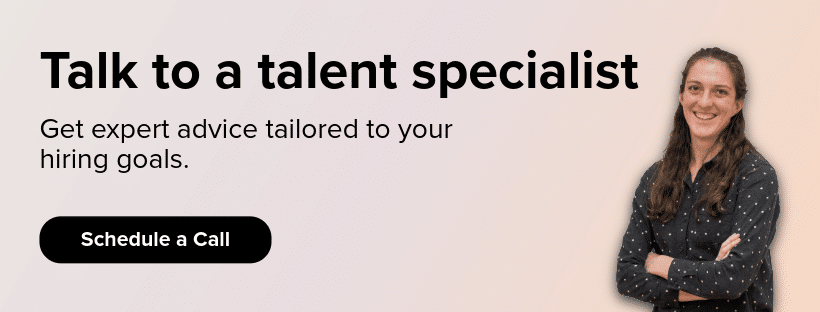
Hiring is hard enough. The last thing you want is to lose great candidates because your application process feels outdated.
Should you ask for a cover letter, or are you just adding friction to your candidate pipeline?
I’ve worked with hiring teams across industries—from engineering to architecture and IT—and this is a question that pops up across the board. So, let’s settle it.
In this article, I’ll explain:
- If cover letters improve candidate quality
- If cover letters are still relevant in today’s hiring processes
- If cover letters should be required for some roles/industries, but not others
- If there are any better alternatives to cover letters
- How to communicate your cover letter expectations in job postings
Key Takeaways – Should You Ask for a Cover Letter in 2025?
It depends on the role, but in most cases, cover letters are no longer essential.
- Use a cover letter when hiring for leadership, client-facing, or communication-heavy roles.
- Skip the requirement for technical or high-volume roles where speed and clarity matter most.
- Best practice: Make cover letters optional. If you want one, be clear about what to include.
Are Cover Letters Still Relevant in Today’s Hiring Processes?
Cover letters used to be the default. A resume, a cover letter, and a handshake.
But in 2025, many hiring processes are becoming more digital, lean, and candidate-first. People apply for jobs on their phones, recruiters scan resumes in seconds, and great candidates may pass you by if your process feels like a time drain.
Some job boards now allow applicants to skip cover letters entirely. Others auto-generate them with AI, which raises even more questions about their authenticity.
So, are they still relevant? Sometimes. But not always.
What Do Hiring Managers Think About Cover Letters? What Do Candidates Think?
Hiring managers are split. Some love the insight a cover letter provides and think they’re a valuable tool to distinguish similar candidates. Others never read them. According to this survey, only 60% of companies require them.
Most candidates don’t love writing cover letters and would rather avoid it when possible. That’s why we’ve seen an uptick of AI-generated cover letters. Candidates are more likely to see writing them as busy work, especially when the job description doesn’t say what the cover letter should include.
Improving Candidate Quality vs. Hurting Your Hiring Funnel
This is the heart of the debate. Should you require a cover letter to ensure you’re hiring the right person, or should you skip the requirement to ensure the right person will apply?
Done well, a cover letter can:
- Show genuine interest in your company
- Highlight communication skills
- Explain gaps, transitions, or passion that a 1–2-page resume can’t
But they can also:
- Discourage great candidates who don’t have time or guidance
- Become formulaic or AI-generated (inauthentic)
- Add delays or less candidates to your pipeline
If you’re happy with your candidate pipeline and are able to make great hires with a cover letter requirement, there’s no saying that you should stop. But if you’re struggling to fill roles, especially in technical or high-demand fields, requiring a cover letter could be creating an unnecessary barrier.
Should Cover Letters Be Required for Every Role, or Only Select Positions?
Through my experience, there are some instances where cover letters mean more than others. Here’s when it’s seemed to make sense for my team to ask for one and not ask for one:
| Ask for a cover letter when: | Skip the cover letter requirement when: |
| The role is leadership or executive level The role requires client interaction or external communication Writing skills are critical (e.g., marketing, PR, grant writing) You’re screening for culture and motivation | It’s a high-volume or entry-level role The role is technical, data-driven, or operations-heavy (non-creative) You’re mainly focused on skills, certifications, and/or hands-on experience |
The goal is to create a process that fits the role, not just the tradition.
Are There Better Alternatives to Cover Letters?
Yes, there are some alternatives that send better signals than a generic cover letter for certain roles or hiring situations.
Some options to consider instead of a cover letter are:
- A short application question (e.g., What interests you about this role?)
- A project portfolio link or PDF
- A short video introduction
- A skills-based assessment
These are typically faster to review, more authentic, and more useful than a three-paragraph letter for some roles.
How to Set Clear Cover Letter Expectations in Your Job Postings
Whatever your decision, the key is clarity.
Include one of these lines in your job description:
- “Cover letter optional: If you choose to include one, let us know why this role interests you.”
- “No cover letter required. We focus on your resume to determine experience and fit for this role.”
- “Please attach a short cover letter (max 150 words, PDF or Word format) about why you’d be great in this role.”
This builds trust and respect for your candidates and shows you’re thinking about their time, too.
Let’s Build a Better Hiring Experience Together
Cover letters aren’t dead, but they’re not a one-size-fits-all solution. Hiring is about connection and creating a good experience for all parties involved. Let your process reflect that.
At DISHER Talent Solutions, we don’t just fill open roles. We become a strategic embedded partner that helps you rethink how hiring should feel—for hiring teams and candidates.
If your hiring process needs a refresh or you’re struggling to attract the right people, let’s talk. We’ll help you evaluate every step of your process, including whether that cover letter requirement is helping or hurting.




